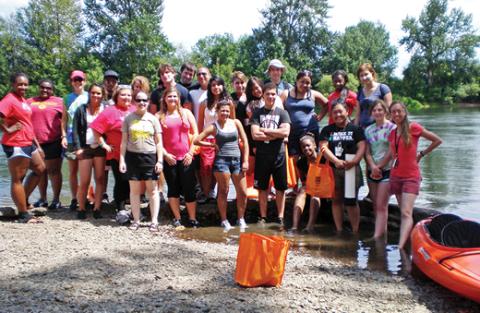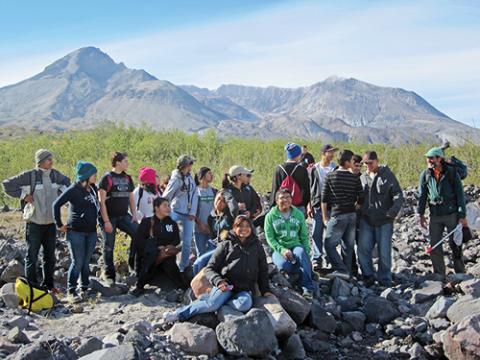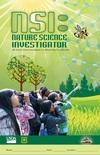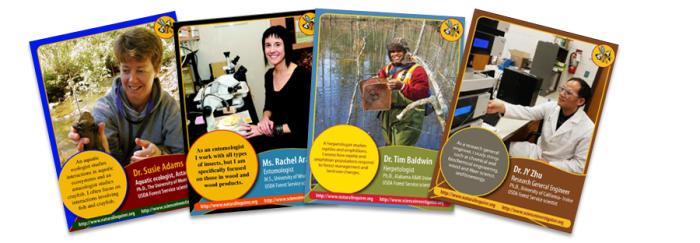Conservation Education
Conservation education helps people of all ages understand and appreciate our country's natural resources and ecosystems while learning how to conserve them for future generations. Defined as a lifetime learning process that promotes the understanding of natural resources and ecosystems – their interrelationships, conservation, use, management and value – conservation education is an effective, dynamic means for the Forest Service to connect the American people with their environment.
Conservation Education Programs

As a leader in the scientific study of natural resources, it is the mission of the Pacific Northwest Research Station to communicate its findings to help people understand and make informed decisions about the environment. The PNW Research Station’s commitment to conservation education aligns with national Forest Service goals, as well as the national Conservation Education Program. The Conservation Education Program works with partners to coordinate development and delivery of high-quality, science-based education about forests, grasslands, and related natural resources to pre-kindergarten through 12th grade students and their educators, in both formal and non-formal settings.
Canopy Connections
Every year hundreds of 6th and 7th grade students from Oregon middle schools spend a day at H.J. Andrews Experimental Forest learning about forest ecology - all while climbing into the canopy of old-growth forests. The program’s mission is to inspire a sense of wonder and respect for our natural world through a curriculum that integrates science, art, and creative writing. Undergraduates from the University of Oregon act as team leaders. The University of Oregon Environmental Leadership Program, The Pacific Tree Climbing Institute and the research station developed this annual innovative experiential learning program.
Fish are cool…
Or at least, they really like cold water! Elementary-age children across Oregon discover this when their classrooms participate in a program through the Oregon Department of Fish and Wildlife’s Salmon and Trout Enhancement Project that helps bring rainbow trout eggs into the classroom. “Trout International,” a concurrent program developed by research fish biologist Rebecca Flitcroft, connects a few of these classrooms with classrooms in Northern Ireland who are hatching their own native trout, the dollaghan trout. This opportunity teaches children that people all over the world are facing many of the same challenges in maintaining local populations of native trout. Watch classrooms participating in Trout International release the baby trout they have hatched during a special event sponsored by PNW Research Station (Video courtesy of Chapman Hill Elementary).
Inner City Youth Institute
The Inner City Youth Institute (ICYI) connects underrepresented youth with careers and experiences in natural resources. Each year, approximately 100 students participate in the program. Throughout the school year, ICYI sponsors forest ecology and stewardship activities for students in Portland inner city high schools. During a typical school year, students who participate in ICYI plant trees, clean up beaches, and help remove invasive plants.
During the summer, students can participate in day hiking trips and as well as a weeklong summer camp. The camp typically begins at the campus of Oregon State University. Participants stay in dorms, explore campus and participate in team building exercises, and also dissect fish with scientists at the John L. Fryer Salmon Disease Laboratory. After 2 days on campus, the teens head for the Oregon coast. Over the next 3 days they camp, hike, and explore the Oregon Dunes while working alongside Siuslaw field rangers and trail crew members who share their own stories of how and why they came to serve America’s public lands. The camp concludes with student presentations to parents and sponsoring agency representatives. ICYI is a partnership between the Forest Service PNW Research Station, the Forest Service PNW Region, Oregon State University’s 4-H program, and the Bureau of Land Management.
Duwamish Valley Youth Corps
The Duwamish Valley Youth Corps (DYVC) is a youth conservation education and stewardship group composed of local youths living in low income, ethnically diverse neighborhoods in the Duwamish River Valley, Seattle, Washington. The youth maintain trails, clean up rivers and riparian areas, and plant trees, shrubs, and rain gardens in Duwamish River Riparian Zone. Because of heavy industrial pollution, the Environmental Protection Agency designated the lower 5 miles of the Duwamish River a Superfund site in 2001. The surrounding neighborhood in South Seattle is known to residents as the industrial district and faces high poverty and crime rates.
Recently, DVYC planted 250 trees in urban neighborhoods of South Park and Georgetown, picked up truckloads of trash from neighborhood parks and streets, and assisted 45 residents in building high-quality home air filters to improve indoor air quality. DYVC was launched in 2014, as an Urban Waters Federal Partnership between the Pacific Northwest Research Station and other federal agencies. It aims to help empower youth and provide them with career training while also achieving environmental restoration goals.
Mount St. Helens High School STEM Field Ecology Program

The STEM High School Field Study provides tenth-grade biology students with project-based learning alongside STEM professionals.
This program has 3 goals:
- Engage students in ecological projects that include all aspects of field-based studies and subsequent analyses, interpretation and presentation.
- Develop students’ critical thinking and problem-solving skills.
- Connect students to a wide variety of science professionals and their career stories. Over 700 students and 9 teachers have conducted field research at Mount St. Helens with natural resource professionals from a variety of public and private entities. In addition to the multi-day field experience, the program includes a summer teacher training workshop, curriculum with an emphasis on data entry and analysis, and an end-of-year research summit at Washington State University, Vancouver, WA.
Learning about Amphibians and their Habitats
Each year, 60 students at Brush Prairie Public Schools, WA, learn about the life history, habitat associations, reproductive biology, and general ecology of amphibians in classroom, laboratory, and field setting. The program is in its 9th year, and is a partnership between PNW Research Station scientists and the school’s Center for Agriculture, Science, and Environmental Education.
Each year, students spend 4 to 6 weeks developing research questions; gathering, managing, and analyzing data; and presenting their results at the end of the school year. The project is modeled after research at Mount St. Helens by PNW Research Station scientists.
OSU 4-H Forest Explorers
The OSU 4-H Forest Explorers is a program partnership between Oregon State University (OSU) Extension 4-H and the PNW Research Station. The program provides 4th grade students from urban neighborhoods of the Portland Metro area with the opportunity to spend a day exploring and learning about forests. The partnership is part of a greater emphasis on collaboration with local and regional organizations in developing out-of-school Science, Technology, Engineering and Math (STEM) programming. Forest Explorers fosters personal growth, outdoor experiences, and valuable learning opportunities by providing 4th graders time outdoors with their peers and qualified teachers and mentors.
Science Fairs
By participating in science fairs, PNW Research Station encourages budding young scientists and provides the students with opportunities to interact with station scientists.
WA State Science and Engineering Fair
Every spring, PNW scientists serve as judges at the WA State Science and Engineering Fair, Bremerton, WA. This is the state fair for science and engineering and a good opportunity to provide feedback to a diverse group of students working on many types of projects. Scientists evaluated projects for awards in natural resources and statistical thinking. There are typically 600 projects with an overall attendance of over 3,000 people.
Northwest Science Expo
PNW Research Station sponsors “Outstanding Natural Resource Science” awards to a high school and a middle school student at the Northwest Science Expo, an annual science fair for young scientists, engineers, and mathematicians, at Portland State University in April. The station also participates in judging.
Curriculum
PNW Research Station scientists engage with partners in creating curriculum for students K-12.
Agriculture and Climate Change in Alaska: a curriculum for grades 6-12
The Northwest Climate Hub worked with Alaska Future Farmers of America to develop curriculum for grades 6-12 focusing on agriculture and climate change in Alaska. The learning modules include lesson plans, presentations, and materials required.
Publications
The U.S. Forest Service works with a number of partners, including the Cradle of Forestry Interpretive Association, to produce free, high quality, science journals written especially for kids.
Science Investi-gator
The Investi-gator is a free science journal that is written for kids in grades 4 through 8. In this issue, you will find research that focuses on the Pacific Northwest region of the United States. The scientists in this region have been studying how climate change may be affecting different animals, plants, and ecosystems. There are 4 main topics: amphibians, trees, wolverines, and glaciers. Download the Science Investi-gator.
Natural Inquirer

Since 1998, scientists and writers have been creating the Natural Inquirer, a free science journal for middle through high school age students. One of the issues is devoted to soils in southeast Alaska and the amount of nutrients that come from decomposing salmon. These nutrients are called salmon-derived nutrients, or SDN. David d’Amore, a soil scientist at the PNW Research Station, has been studying SDN for many years and helped write the issue. D’Amore and other scientists looked at how alluvial soil affected the role of SDN in the North Pacific coastal rainforests of southeast Alaska. Download Food for the Soil.
Natural Inquirer Readers

Natural Inquirer Readers are for pre-kindergarten through grade 2 students. Each Reader introduces a U.S. Forest Service scientist and their research. The 7th issue is called Meet Dr. Flitcroft, and it focuses on PNW Research Station fish biologist Rebecca Flitcroft. Flitcroft studies salmon, and the Reader describes her research on salmon habitat. Download Meet Dr. Flitcroft.
NSI: Nature Science Investigator
NSI: Nature Science Investigator is a self-guided activity book for children ages 8 through 14. The booklet enables each student to become the scientist. Eleven Forest Service scientists – including PNW Research Station scientists Trista Patterson, an ecological economist, and Brian Potter, an atmospheric scientist – are highlighted. The activity book includes several outdoor, hands-on activities related to each scientist’s research. For example, activities on Potter’s page ask children to spend time observing cloud cover, while one of the activities on Patterson’s page asks children to identify ecosystem services and think about their economic value.
Scientist Cards
More than 130 Forest Service scientists – ecologists, engineers, foresters, social scientists, wildlife biologists, and many others – are featured on the Natural Inquirer scientist cards. Each card describes the scientist’s field and also includes personal reflections about their most exciting discoveries and about the moment they realized they wanted to become a scientist. Download Scientist Cards.



